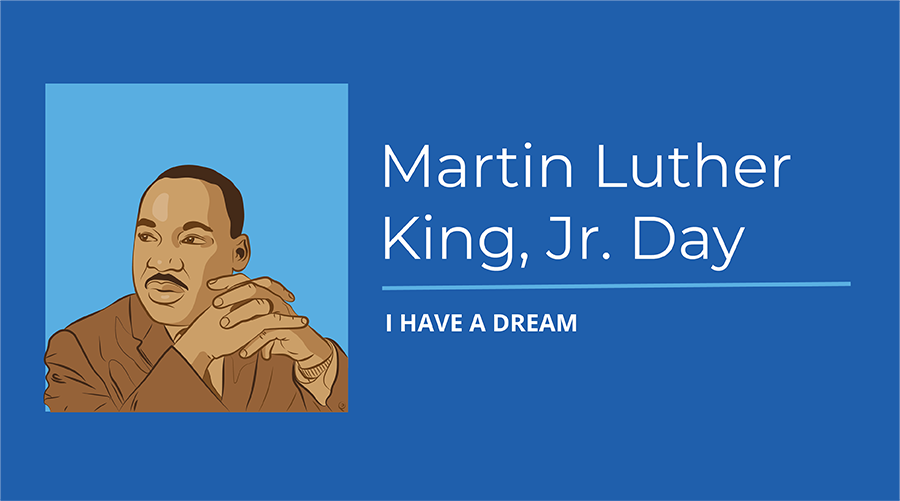
Martin Luther King, Jr. Day
Martin Luther King, Jr. Day is a federal holiday and day of service in the United States created to honor the life and legacy of the renowned civil rights leader, Martin Luther King, Jr. who advocated the use of nonviolent means to protest segregation and other forms of racial injustice. The most influential of African American civil rights leaders during the 1960s, he was instrumental in securing the passage of the Civil Rights Act of 1964 and the Voting Rights Act of 1965. Martin Luther King, Jr. Day was observed for the first time on January 20, 1986, following its passage into law. The holiday is observed annually on the third Monday in January.
About Martin Luther King, Jr.
The Rev. Dr. Martin Luther King, Jr. was a Baptist minister and activist who became a leading figure in the Civil Rights movement. King’s advocacy was distinguished by his strict adherence to nonviolence and civil disobedience. King led the 1955 Montgomery bus boycott and later became the first president of the Southern Christian Leadership Conference (SCLC).
In 1963, he helped lead a coalition of civil rights groups in a nonviolent campaign in Birmingham, Alabama, which was described as the “most segregated city in America” at the time. The nationally televised brutality police used against nonviolent protestors led to national outrage and renewed energy for unprecedented civil rights legislation. King drafted the “Letter from Birmingham Jail” during that campaign.
Later that year, King organized the 1963 March on Washington, where he delivered his “I Have a Dream” speech from the steps of the Lincoln Memorial.
In 1964, at the age of 35, Martin Luther King, Jr. became the youngest man to receive the Nobel Peace Prize. When he was notified of his selection, he announced that he would donate the prize money of more than $50,000 to further the civil rights movement.
That same year, the United States Congress passed the landmark Civil Rights Act, which prohibits discrimination on the basis of race, color, religion, sex or national origin in 1964 and the Voting Rights Act, which prohibits racial discrimination in voting in 1965.
Between 1965 and 1968, King shifted his focus toward economic justice and international peace, which he championed by speaking out against the Vietnam War. His work culminated in the Poor People’s Campaign, which was an effort to build a multiracial coalition of impoverished and working Americans to advocate for economic changes.
On April 4, 1968, Martin Luther King, Jr. was assassinated by gunshot while he was on the balcony of his motel room in Memphis, Tennessee, where he was planning to lead a protest march in solidarity with striking garbage workers. At the time, King was also planning a significant and peaceful demonstration in Washington, D.C. in furtherance of the Poor People’s Campaign.
National Day of Service
The national Martin Luther King Day of Service was established by Congressman and fellow civil rights leader John Lewis and U.S. Senator Harris Wofford who together co-authored the King Holiday and Service Act. The act challenges Americans to transform the King Holiday into a day of citizen action volunteer service in honor of King. Since the legislation was signed in 1994, the day of service has been coordinated nationally by AmeriCorps.
Visit the AmeriCorps website to learn more about how you can participate with the MLK Jr. Day of Service.
